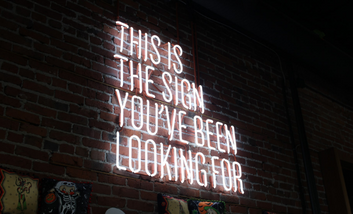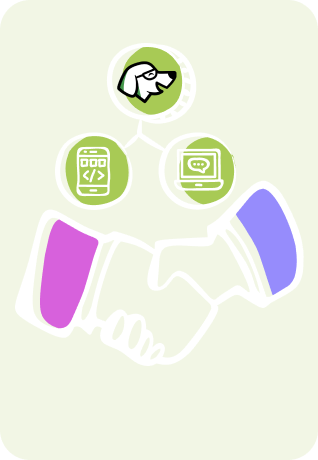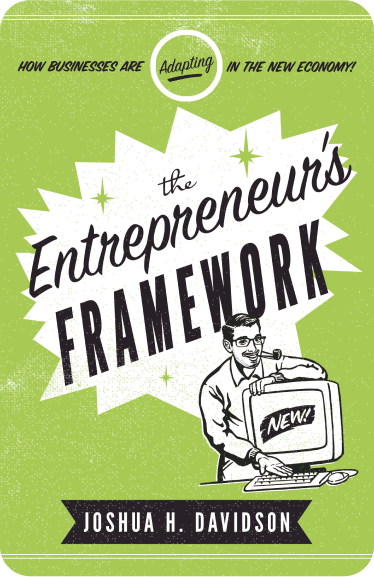Purpose is a big topic when it comes to every aspect of running a business or creating an app. After all, if you don’t know why you are creating a product or spearheading a venture, it is unlikely it will succeed. These social impact startups put a strong purpose at the core of everything they do.
If you are wondering what exactly a social impact startup is, these are startups that apply to tech to solve real-world problems and benefit the public good overall.
So, with that, let’s take a look at what social impact startups are doing around the world. They will continue to do big things in 2023!
Helios
This French fintech startup combines banking with addressing climate change. They have been credited with pioneering an eco-conscious way to bank that can help protect the planet.
Founders Maeva Courtois and Julia Ménayas founded Helios in 2020, with the mission of creating a climate positive banking solution.
Helios does this by making it simple for investors to make greener investments, None of the money in Helios goes toward polluting indistries, like gas or coal. As an eco-bank, Helios only invests in climate-friendly investment projects.
Helios is also different from traditional banking when it comes to transparency. They share complete transparency with users about the destination of financing. Last year was a big year for Helios. They raised 9 million Euros and have built a community of about 50,0000 people.
Convoy: One of the Social Impact Startups Taking on Freight
Convoy is a digital freight network company that was founded in 2015. They use technology to connect shippers and carriers while minimizing negative environmental impact.
Currently, in the US, the trucking industry is worth about $800 billion. However, globally, the frieght industry is a massive contributor to pollution. According to data from MIT:
Billions of tons of cargo are transported around the world each year by trucks, planes, ships, and trains. This transportation makes up 8% of global greenhouse gas emissions, and as much as 11% if warehouses and ports are included.
Convoy is working to lessen the climate impacts of freight trucking within the US. This is their mission statement:
Our mission is to transport the world with endless capacity and zero waste. We use machine learning + automation to move millions of truckloads to benefit the shipper and carrier marketplace and eliminate carbon waste for our planet. The industry is huge and so is the opportunity to change the way freight moves across America.
They automate the matching, pricing, and scheduling of trucks, which reduces costs for shippers. Via app, they make it easier for carriers to find, bid on, and haul loads. Convoy uses technology to help carriers and shippers operate in a more carbon-neutral manner,
Chatterbox
Chatterbox is a London-based language learning startup founded in 2016. It aims to bring companies in contact with a diverse global pool of talent.
What makes Chatterbox unique is that it offers active practice speaking and algorithmically matched native language coaches. These coaches share the professional backgrounds and interests of their students.
Its product is marketed as:
Corporate language training powered by marginalized talent.
Chatterbox is on a mission to teach corporate language skills while helping marginalized professionals globally connect with students and teach their native languages.
This helps to create a more connected world where more people can understand one another and a fairer digital economy. Chatterbox promotes a triple impact model, including its commitment to a positive social impact.
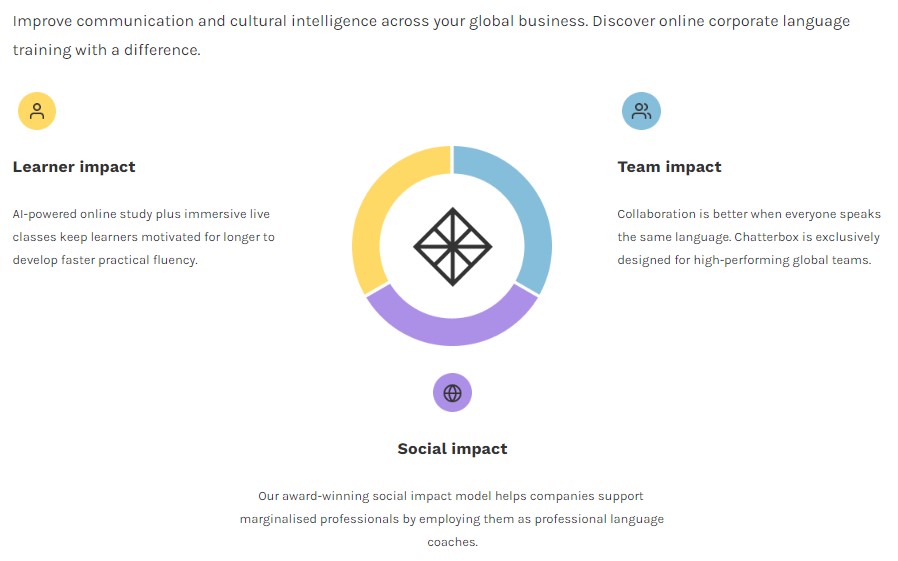
Chatterbox combines AI-powered self-learning modules with practice with native-speaker language coaches to build business vocabulary and professional fluency.
GiveDirectly: Can Social Impact Startups Change How Nonprofits Function?
Over the years, the traditional model of nonprofit charity globally has received some criticism. While well-intentioned, sometimes organizations in wealthier countries simply do not understand the culture or the needs of the people they are trying to help.
This has created many issues throughout the years. Sometimes, global experts cannot even agree on what approaches to take. While they argue, global poverty remains unchanged.
GiveDirectly takes a different approach. According to their site:
GiveDirectly is a nonprofit that lets donors like you send money directly to the world’s poorest households. We believe people living in poverty deserve the dignity to choose for themselves how best to improve their lives — cash enables that choice.
Since 2009, donors have delivered over $580 million to people in need. This money has gone to over a million people living in these countries:
- DRC
- Kenya
- Liberia
- Malawi
- Mozambique
- Morocco
- Nigeria
- Rwanda
- Uganda
- USA
- Yemen
GiveDirectly also does important work to dispel negative stereotypes surrounding the recipients of charity and aid.
Many think that letting nonprofits decide what people in other countries need is the only responsible way to give meaningful aid, as people in poorer countries are unfit to decide for themselves.
GiveDirectly did research into how charity recipients actually use the funds. Their site reads:
We read the research. We read more research. Then we did our own research. And it turns out, people use cash on medicine; cows and goats and chickens; school fees; water; solar lights; tin roofs; irrigation; motorcycles to jumpstart taxi services; businesses to generate income; and more.
Afresh
Afresh is a San Francisco-based startup that aims to eliminate food waste and make fresh food accessible to everyone. The problems of food waste and widespread lack of access to food are ones that many social impact startups are tackling.
The US has two rather large and opposite problems. According to data from Feeding America, nearly 120 billion pounds of food is wasted in the US each year. This is about 40% of all of the food in the country. Meanwhile, about 34 million Americans are currently hungry.
This is why Afresh wants to build a better fresh food ecosystem. According to their site:
By building technology to reduce food waste, we also cut back on water use and carbon emissions throughout the fresh supply chain. We’re proud to contribute to making our world more sustainable, all while delivering business impact for our customers.
So far, Afresh says they have reduced 3.82 thousand tons of GHG emissions, saved 140 million gallons of water, and prevented nearly 7 million pounds of food waste.
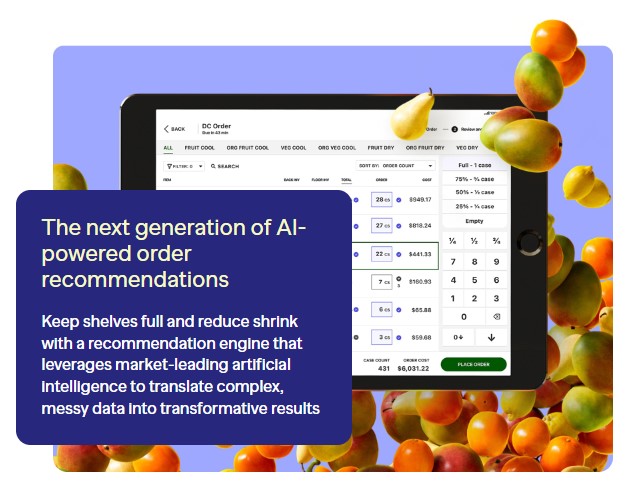
The startup offers technology-powered inventory solutions that use both AI and user input to help those in the business of grocery be more efficient. They say:
Traditional inventory and demand forecasting methods can’t keep up in fresh. Transform your fresh performance with holistic solutions that consider all of the dynamics of fresh: data, merchandising, store workflows, demand, inventory, perishability, variability, and more.
Final Thoughts on Social Impact Startups to Look Out For in 2023
As you can see, social impact startups cover a wide range of niches. This includes everything from fighting food waste to injecting ethics into finance to reimagining global aid and charity.
Creating businesses that are not only environmentally friendly but more ethical when it comes to the treatment of workers is a priority for many in the world of startups at this time.
This can be seen especially when it comes to the fashion tech startup niche.
The fashion industry is notorious for its many structural problems, but enterprising startups are working to change that. If you want to learn more, take a look at our blog post on the subject here!
In many ways and across many industries, ethics are becoming a main priority. Many startups within and without of the social impact niche are taking on elements of it in big and small ways.
For example, Convoy, which we mentioned above, offers comprehensive benefits to employees which are not common in the US. This includes things like parental leave.
Over time, especially when it comes to climate concerns, building with social impact in mind may become necessary for all startups and businesses in general.
What do you think? Comment below.
Since 2009, we have helped create 350+ next-generation apps for startups, Fortune 500s, growing businesses, and non-profits from around the globe. Think Partner, Not Agency.
Find us on social at #MakeItApp’n®




